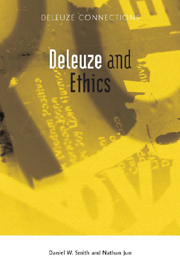Book contents
- Frontmatter
- Contents
- Acknowledgments
- Introduction
- 1 Whistle While You Work: Deleuze and the Spirit of Capitalism
- 2 The Ethics of the Event: Deleuze and Ethics without Aρχή
- 3 While Remaining on the Shore: Ethics in Deleuze's Encounter with Antonin Artaud
- 4 Responsive Becoming: Ethics between Deleuze and Feminism
- 5 Deleuze, Values, and Normativity
- 6 Ethics and the World without Others
- 7 Deleuze and the Question of Desire: Towards an Immanent Theory of Ethics
- 8 “Existing Not as a Subject But as a Work of Art”: The Task of Ethics or Aesthetics?
- 9 Deleuze, Ethics, Ethology, and Art
- 10 Never Too Late? On the Implications of Deleuze's Work on Death for a Deleuzian Moral Philosophy
- 11 Ethics between Particularity and Universality
- Notes on Contributors
- Index
10 - Never Too Late? On the Implications of Deleuze's Work on Death for a Deleuzian Moral Philosophy
Published online by Cambridge University Press: 12 September 2012
- Frontmatter
- Contents
- Acknowledgments
- Introduction
- 1 Whistle While You Work: Deleuze and the Spirit of Capitalism
- 2 The Ethics of the Event: Deleuze and Ethics without Aρχή
- 3 While Remaining on the Shore: Ethics in Deleuze's Encounter with Antonin Artaud
- 4 Responsive Becoming: Ethics between Deleuze and Feminism
- 5 Deleuze, Values, and Normativity
- 6 Ethics and the World without Others
- 7 Deleuze and the Question of Desire: Towards an Immanent Theory of Ethics
- 8 “Existing Not as a Subject But as a Work of Art”: The Task of Ethics or Aesthetics?
- 9 Deleuze, Ethics, Ethology, and Art
- 10 Never Too Late? On the Implications of Deleuze's Work on Death for a Deleuzian Moral Philosophy
- 11 Ethics between Particularity and Universality
- Notes on Contributors
- Index
Summary
Quicksand
So you lie on the rushed mattress of torn branches; terrified as you feel the same wet mass suck at your dampening clothes. And you reach out. The human beast claws at your hand, nails scraping down the inner flesh of your forearm, leaving minute traces of living matter, its rigid fingers a premonition of the tar pit skeleton they are to become. Then it's gone. An individual life, with all its singular values and loving relations, connected to yours for a desperate and too brief time, incomparable and never to return, putrefying in the airless swamp.
Too Late
What could have been done differently? What should be learned? How can we salvage a general moral consolation from the particular disaster, when perhaps even the shared label of “particular” is already a betrayal of the singular events? Is there any consolation to be drawn from the end, from the choking, terrified, doomed struggle of the beast, perhaps some other rebirth, a memorial, a celebration of survival and a remembrance of sacrifice? More wisely, and against the corrosion of guilt and what ifs, of necessary communal self-deception, how can we work together against any repetition? They let it happen again …
The moral problem under consideration here is not in any given prescription. “Keep away from the sands.” It is not even in any more abstract law. “Always act to preserve a fellow beast’s life; right up to the very limit of yours.” It knows almost nothing of calculations and recipes.
- Type
- Chapter
- Information
- Deleuze and Ethics , pp. 171 - 187Publisher: Edinburgh University PressPrint publication year: 2011

